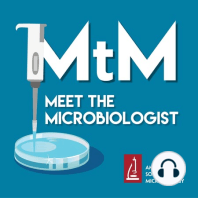29 min listen

MTS5 Brett Finlay - E.coli and the Human Gut
MTS5 Brett Finlay - E.coli and the Human Gut
ratings:
Length:
21 minutes
Released:
Oct 2, 2008
Format:
Podcast episode
Description
Brett Finlay is a professor in the Michael Smith Laboratories, and the Departments of Biochemistry and Molecular Biology, and Microbiology and Immunology at the University of British Columbia.
His research program focuses on E. coli, how it interacts with the cells of the human gut, and mouse models of E. coli-like infections. Dr. Finlay will speak at the conference on Beneficial Microbes in San Diego this October, where he’ll describe the results of some of his latest research, which examines how E. coli infections effect the microbes that live in our guts.
Sadly, outbreaks of Escherichia coli infections in this country are common – just this summer a huge E. coli outbreak in Oklahoma sickened nearly 300 people and sent 67 of them to the hospital. Clearly, in an outbreak, not everyone is effected equally. When lots of people are exposed to E. coli, why do some of those people walk away unharmed while others wind up in the I.C.U.? Dr. Finlay would say part of the answer, at least, probably lies in which microbes live in our intestine.
In this podcast, I talked with Dr. Finlay about why we have so many different kinds of microbes in our guts, what happens to them when E. coli strikes, and why we have a long way to go before probiotics offer help – and not just hope.
His research program focuses on E. coli, how it interacts with the cells of the human gut, and mouse models of E. coli-like infections. Dr. Finlay will speak at the conference on Beneficial Microbes in San Diego this October, where he’ll describe the results of some of his latest research, which examines how E. coli infections effect the microbes that live in our guts.
Sadly, outbreaks of Escherichia coli infections in this country are common – just this summer a huge E. coli outbreak in Oklahoma sickened nearly 300 people and sent 67 of them to the hospital. Clearly, in an outbreak, not everyone is effected equally. When lots of people are exposed to E. coli, why do some of those people walk away unharmed while others wind up in the I.C.U.? Dr. Finlay would say part of the answer, at least, probably lies in which microbes live in our intestine.
In this podcast, I talked with Dr. Finlay about why we have so many different kinds of microbes in our guts, what happens to them when E. coli strikes, and why we have a long way to go before probiotics offer help – and not just hope.
Released:
Oct 2, 2008
Format:
Podcast episode
Titles in the series (100)
MTS10 - Anthony Maurelli - Black Holes and Antivirulence Genes: Tony Maurelli is a professor of microbiology and immunology in the F. Edward Hébert School of Medicine at the Uniformed Services University of the Health Sciences in Bethesda, Maryland. Dr. Maurelli’s major research interest lies in the genetics of bac by Meet the Microbiologist